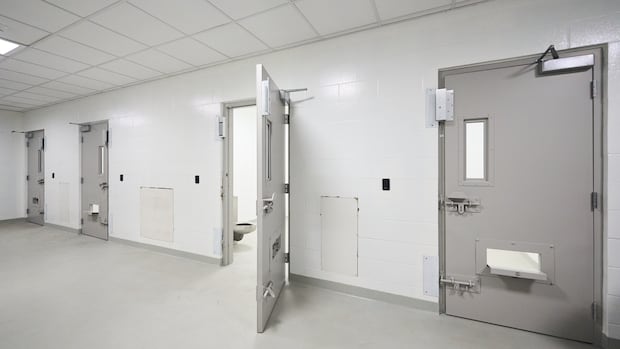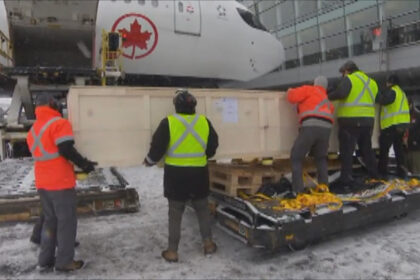ManitobaThe Manitoba government defended its plan Monday to detain people intoxicated with methamphetamines and other drugs for up to 72 hours at a new facility in central Winnipeg.Province offered 1st tour of facility, set to open with by the end of the month Steve Lambert · The Canadian Press · Posted: Nov 17, 2025 5:06 PM EST | Last Updated: 6 hours agoListen to this articleEstimated 5 minutesThe audio version of this article is generated by text-to-speech, a technology based on artificial intelligence.The soon to be opened protective care centre, also known as a sobering centre, will detain people high on drugs for up to 72 hours in Winnipeg. ( David Lipnowski/The Canadian Press)The Manitoba government defended its plan Monday to detain people intoxicated with methamphetamines and other drugs for up to 72 hours at a new facility in central Winnipeg.”For far too long, what we’ve been doing has not been working and we’re taking a different approach because Manitobans have said they don’t feel safe in their communities,” Bernadette Smith, the minister of housing, addictions and homelessness, told reporters invited to tour the building, which is set to start operating by the end of the month.”We know that people aren’t feeling safe when they’re doing substances either, and we want to intervene.”The NDP government recently passed a law to extend the amount of time highly intoxicated people can be detained to 72 hours from 24, in order to deal with the longer-lasting effects of methamphetamines.The new protective care centre is to be run by Main Street Project, a non-profit that has for decades run a nearby 24-hour centre commonly called the “drunk tank.”At the moment the sobering centre has 20 rooms down a long hallway. There are plans for another 20 rooms to be added later. (David Lipnowski/The Canadian Press)The new building features sparse three-metre-by-three-metre cell-like rooms with a toilet, sink, video surveillance and an intercom. There are 20 rooms down a long hallway, with plans for another 20 rooms to be added later.The plan for 72-hour detentions has been criticized by some community groups that have argued that holding people against their will for up to three days criminalizes addiction. Mark Wasyliw, an independent legislature member kicked out of the NDP caucus last year, recently said the government’s plan amounts to solitary confinement for people struggling with addiction.Some residents who live near the centre have opposed the location because it is close to a high school.Health officials said Monday the new facility will offer more health supervision and connection to addiction treatment than Main Street’s existing facility.Paramedics are expected to be on-site around the clock and people being detained will be assessed frequently, said Dr. Rob Grierson, the chief medical officer at Shared Health, Manitoba’s central health planning agency. Grierson is also the medical director of Winnipeg’s fire and paramedic service.People will have to be cleared by a hospital before coming to the centre, he added, and will be offered follow-up care as they prepare to depart. Housing, Addictions and Homelessness Minister Bernadette Smith says sobering centres could also be opened in other cities such as Brandon and Thompson. (David Lipnowski/The Canadian Press)”The care of people when they leave this facility is going to be much more substantive. So there’ll be access to addictions care, access to mental health professionals and that type of care available either on-site or very close,” Grierson said.Smith said future centres could be opened in other cities such as Brandon and Thompson.She said being detained in the new centre is a better alternative to what often happens to people high on drugs such as meth.”We can’t keep incarcerating people and we can’t keep our health services tied up, and this is another tool for us to help get people the supports that they need.”During Monday’s tour, Main Street Project executive director Jamil Mahmood said the new facility will be a substantial upgrade from their current facility and far more “humane,” saying those housed at the old “drunk tank” used a grate in the floor when they had to go to the washroom. Main Street Project executive director Jamil Mahmood speaks during a tour on Monday of the city’s new protective care centre that will be run by Main Street Project. (CBC)“So it was pretty inhumane,” Mahmood said. “We weren’t pleased with how the old site worked, so we were able to do some upgrades here to provide a more humane facility, having the toilets, having the sinks, we’re going to upgrade mattresses, things like that.”He added the new site will be staffed 24/7, and they will add two new case manager positions at the facility, as they hope to improve their planning around when people are discharged, in the hopes that they don’t immediately fall back into addictions. “We think we’ll do a much better job of when people leave, that they’ll have the support they need to maybe not end up back here again in the future,” Mahmood said. “That’s our goal, is to try to break that cycle of addiction. “Ideally everyone leaves here with a plan and connections, and are going right to another resource from here.” Mahmood said there are now plans to tear down the old facility, which he said is in a state of disrepair, and to build a new protective care facility at the site that would be used specifically to house members of the LGBTQIA+ community. WATCH | First look at Winnipeg’s new detox centre :First look at Winnipeg’s new detox centreThe Manitoba government gave media a tour Monday of its new 20-bed detox centre for highly intoxicated people, located at 190 Disraeli Fwy., before it opens the facility’s doors later this month. With files from Ian Froese
Thursday, 5 Mar 2026
Canada – The Illusion
Search
Have an existing account?
Sign In
© 2022 Foxiz News Network. Ruby Design Company. All Rights Reserved.
You May also Like
- More News:
- history
- Standing Bear Network
- John Gonzalez
- ᐊᔭᐦᑊ ayahp — It happened
- Creation
- Beneath the Water
- Olympic gold medal
- Jim Thorpe
- type O blood
- the bringer of life
- Raven
- Wás’agi
- NoiseCat
- 'Sugarcane'
- The rivers still sing
- ᑲᓂᐸᐏᐟ ᒪᐢᑿ
- ᐅᑳᐤ okâw — We remember
- ᐊᓂᓈᐯᐃᐧᐣ aninâpêwin — Truth
- This is what it means to be human.
- Nokoma











